Source: umagazine
Science and technology drive social progress. Ten years ago, who would have imagined that smart cities, smart houses, and smart cars would become part of our everyday lives in a smart future? In an age where artificial intelligence permeates every social sphere, what are the essential skills college graduates must possess in order to rise to the challenges presented by these new, smart technologies?
Big data plays an important role in managing smart cities. Indeed, without big data, there would be no smart city. Perhaps that is why, when the Macao SAR government announced earlier this year a plan to develop Macao into a smart city, it clearly defined the smart city as characterised by data-driven technology and artificial intelligence that is used to improve residents’ quality of life. In this issue, we interview two members of the University of Macau’s (UM) management team, Rector Wei Zhao and Vice Rector for Academic Affairs Lionel Ni, who are both world-renowned experts on big data and the Internet of Things (IoT). They share with us the significance of Macao’s smart city project and suggest what UM can do to produce big data experts to embrace a smart future.
How Does Macao Create a Smart City?
According to Wikipedia, the ‘smart city’concept originated with IBM. In 2008, the company proposed the concept of a ‘smart city’ when discussing how to make good use of information and communications technologies to improve various city functions. The idea behind the ‘smart city’ is that through the application of new generation information technology, authorities will be able to manage manufacturing processes and other facets of everyday life in a more precise and dynamic manner. By embedding sensors into various physical objects scattered around the world, such as power supply systems, water supply systems, transport systems, oil and gas pipelines, and buildings, we can create an IoT connected to the internet. With the support of super computers and cloud computing, we can then realise a seamless fusion between the actual physical world and the virtual cyber world.
In August 2017, in an important first step towards creating a smart city, the Macao SAR government signed a framework agreement with Alibaba Group on strategic collaboration in this area. Prof Lionel Ni, who is in charge of strategy research for Macao’s smart city development, points out that ‘smart cities’ have become a focus of intense interest in urban and industrial development, and many cities in the United States, Spain, Japan, and China have already launched plans to develop smart cities. According to the 12th Five-Year Plan released by the Chinese government, over 320 cities in mainland China have started the process of transitioning to smart city status. Indeed, smart city development appears to have become an inexorable global trend.
How does Macao become a smart city? Prof Ni offers the following suggestions: ‘We should build a smart city with distinctive local characteristics. We need to adopt a holistic approach in planning and overcome the bottlenecks in development. We also need to integrate policies, theories, practice, and industrial development in order to create an integrated ecosystem for a smart city. In this area, Macao is still in its infancy compared to countries and regions that have already started the process. The most urgent tasks for the government now include developing a theoretical framework, identifying the priorities and strategies, and studying the practicality and feasibility of administrative systems, operational systems, laws and regulations, as well as technological innovations.’
The process of designing a smart city is usually approached from multiple angles, measured against multiple standards, and analysed at multiple scales. For this reason, Prof Ni suggests that the Macao SAR government should employ uniform standards and integrate technologies in the planning process. Ni believes the effort should focus on city development, and be guided by top-level design, supported by a technological framework, and featuring applications of smart products, in order to gradually carry out innovative projects and ensure that smart products and capabilities can be delivered in an orderly fashion.
‘In the process of building a smart city, Macao needs to strike a balance between five pairs of seemingly contradictory priorities, namely the quality of city development versus economic benefits, short-term project innovation versus long-term sustainable development, economic diversification versus Internet Plus, decision-making by the government versus participation and supervision by the public, as well as the top-down goal-based approach versus the bottom-up problem-based approach,’ he says. ‘Top-level design should be done on three levels: planning, operation, and monitoring, in order to achieve better integration in technology, business, and data.’
Talented People Are Indispensable in Creating a Smart City
Smart cities cannot be created overnight. Rather, it is a long, systematic process. Prof Ni puts it this way: ‘Building a smart city requires expertise in different areas and a lot of professionals in public administration, economy, law, and science and technology, especially high-calibre, interdisciplinary, innovative professionals. In the process, UM needs to constantly explore new ways for technological innovation, align with the future direction of government policy, and provide support for decision-making in city planning and management. Aside from that, UM must also place an equal emphasis on teaching, research, and practice, enhance resource integration, and produce high-quality professionals for Macao through the “4-in-1” model of education.’
As a public university in Macao, UM shoulders the responsibility of producing graduates whom can advance Macao’s development. Prof Zhao discloses that UM has already formulated a plan for nurturing big data experts. ‘The university plans to create a programme in big data, with the aim of producing interdisciplinary graduates with big data thinking and creativity,’ he says. ‘The programme will combine theoretical knowledge and practice in the classroom and will cover different disciplines. We hope that students of this programme, regardless of their academic background, will have a solid grasp of theoretical knowledge and improved skills in data mining, analysis and management, as these skills are in high demand in today’s world. The early part of the programme will focus on big data for finance, health, and cities, as well as data literacy and data privacy law.’
‘We are living in a time where everything is connected to everything else, and creating a smart city is an opportunity Macao cannot afford to miss,’ says Prof Wei Zhao. ‘But this goal cannot be achieved without the data industry, data trading, and more importantly, talented people. Whether a country or a city can keep pace with the challenges in an age of big data depends, above all else, on whether it can nurture and attract talented people. Smart cities and smart products are driven by data technology, which in turn relies on software and internet economy. The shortage of professionals in these fields is a universal problem faced by countries around the world. ’
Prof Wei Zhao has repeatedly stressed that a university should not become a glorified vocational school, whose goal is merely to prepare students for the job market. A university, he believes, should help students acquire not only hard skills in the form of professional knowledge, but also soft skills pertaining to personal qualities and values, such as leadership, teamwork, communication skills, a sense of responsibility, and a commitment to lifelong learning, to ensure that students can rise up to any challenges they might encounter after graduation. ‘After the first industrial revolution, machinery replaced manual labour. For example, the invention of cars allowed people to move faster and farther,’ he says. ‘Now we are entering a new industrial revolution, characterised by artificial intelligence, big data, and the internet. What this means is that machinery is about to replace (at least part of) intellectual labour. This new industrial revolution will bring young people both enormous opportunities and enormous challenges. ’ ‘Almost every industry will be reshuffled, ’ he adds. ‘Many industries will disappear or be restructured, or new industries might appear. This makes it more important for young people to develop competitive personal qualities, including leadership and critical thinking. Only when they possess these real skills will they be able to emerge victorious from the new industrial revolution.
Establishing the Third State Key Laboratory
Currently, UM is preparing for the establishment of a third state key laboratory, which will specialise in IoT and big data. ‘Data are an important resource and asset of a country in political, economic, social, and cultural arenas,’ says Wei Zhao. ‘They also form the basis for scientific research. IoT is an effective way to collect multi-source data in city construction and management. Big data from multiple sources can serve as the basis for scientific decision making by city planners and managers as well as other stakeholders. Therefore, creating a state key lab in this area is of great significance. ’

cover_2
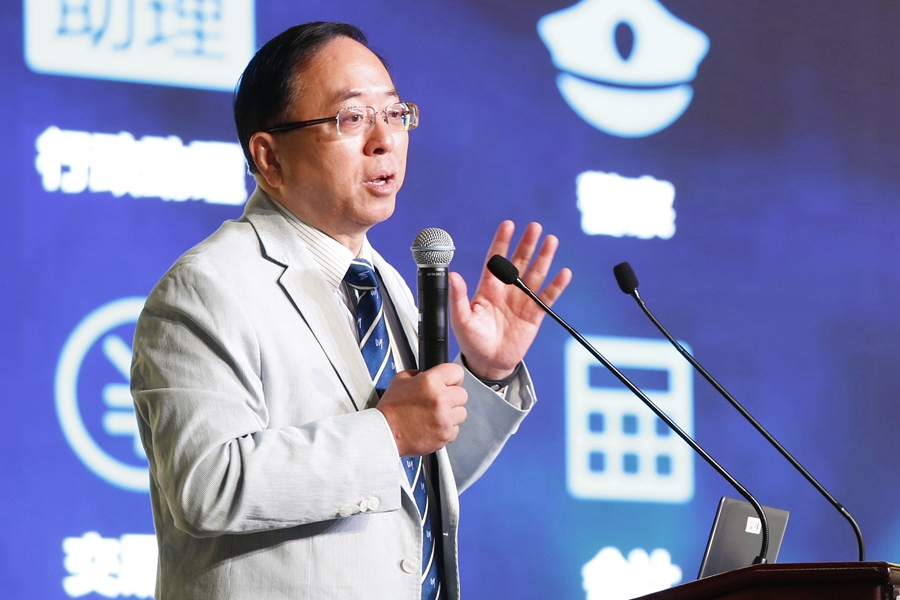
Vice Rector (Academic Affairs) Prof Lionel Ni
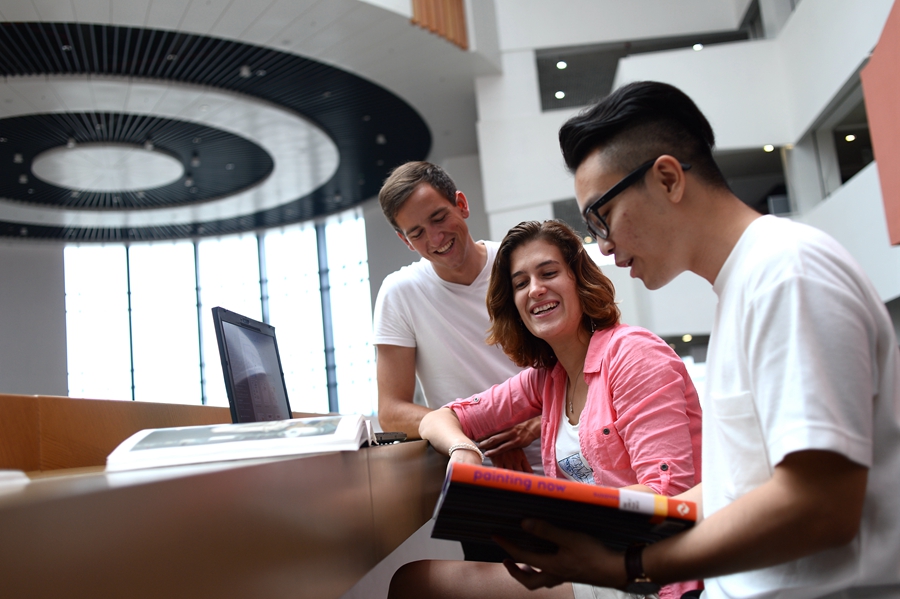
UM is committed to producing interdisciplinary graduates who can rise up to the challenges of a constantly changing world
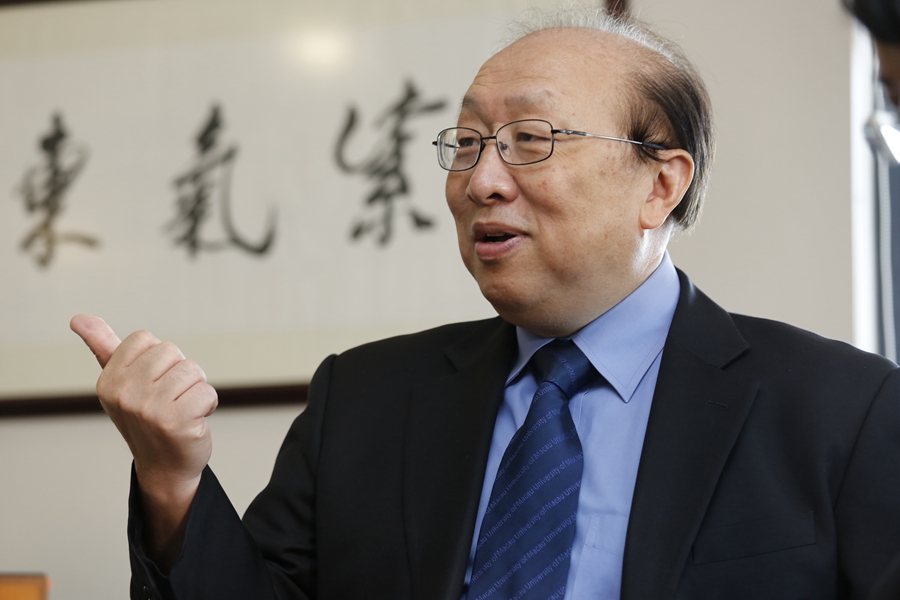
Rector Wei Zhao
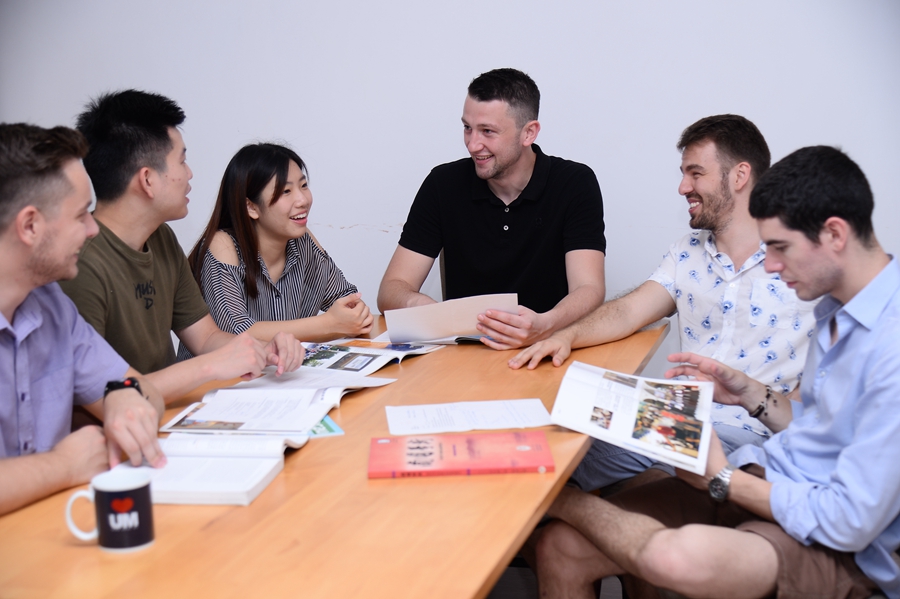
UM plans to create a programme in big data
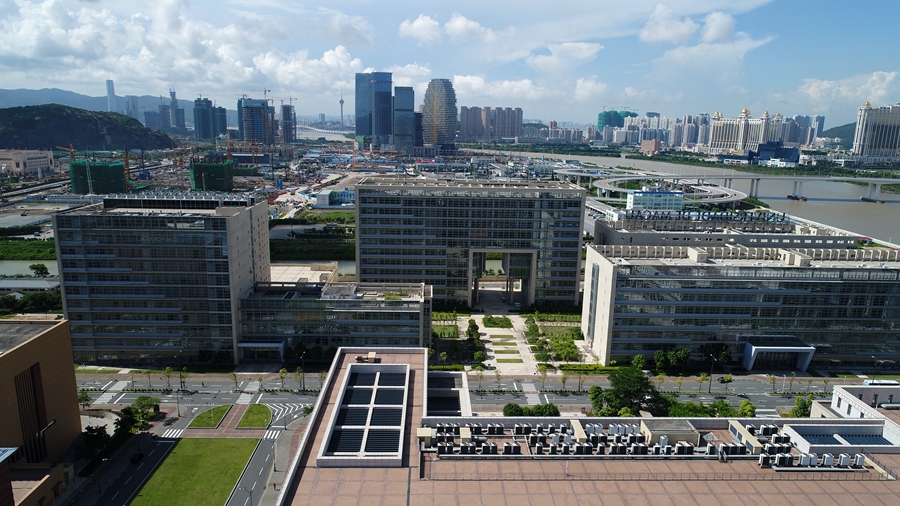
UM is preparing for the establishment of a third state key laboratory
